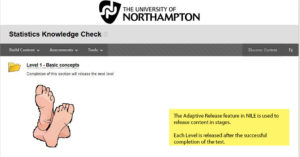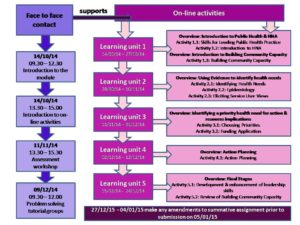The Science and Technology in Pedagogy (STRiPe) Research Group was set up to facilitate those working on teaching and learning activities related to science and technology to collaborate. Pedagogy is central to the success of the University, and having a cross-disciplinary and cross-university groups aims to help with this. STRiPe’s aims to take the work members are doing or planning to do with their students, and help with collaboration.
For information about the group, please see the page on the main University website.
Please click this link to access the blog maintained by School of Science and Technology.
In this associated blog post, Matthew Mccormack details the team approach to the redesign of the MA History, and how the use blogs aligned to evidence one of the key subject benchmark statements.
“Our blog assessment fits in with the module’s fortnightly structure. We alternate between ‘classroom’ and ‘online’, with the blog taking place alongside the online seminar: case studies have emphasised the importance of structuring blogging around the rhythm of classes. Every fortnight, the tutor posts up a primary source that relates to the previous class topic, and the students have 500 words per source to blog about it. After 5 fortnightly blogs, the students submit their work for assessment…One of the key ‘History’ skills highlighted in our subject benchmark is ‘an ability to read, analyse and reflect critically and contextually upon contemporary texts and other primary sources’ – so this is an example of how blending the method of delivery can enhance subject skills.”
The Geography+ project aims to support the development of employability skills in students studying in levels 4 and 5 of the Geography programme. It is currently running as an extra-curricular ‘module’ led by Faith Tucker, with support from staff in the discipline and staff from the Changemaker hub.
For more detail about Geography+, have a look at the overview:
[Posted on behalf of Anne Misselbrook – Content Developer]
Dr Michael Curran PhD, MBA, MPhil is an Associate Professor (Podiatry) and module leader for research methods in Podiatry at the University of Northampton.
One of the research methods modules taught over three years of the BSc Hons Podiatry course is inferential statistics. Mike was keen to increase the blend of this material between face to face delivery and online activity, and this resulted in the Statistics Knowledge Check. He has completed the cycle of transferring content online and students provided feedback using a survey included in the Statistics Knowledge Check.
One of the Podiatry students noted:
“I found tackling the Knowledge Check in 4 separate stages hugely useful and much more manageable than being exposed to a larger test. I found the separate stages less intimidating”.
Dr Curran reflected on the experience:
“It is interesting to me how to blend the concept of e packages with actual face to face teaching. I guess it is the future.
On reflection I think we have hit the middle ground of evaluation with no very favourable student comment, but equally no very unfavourable comment. Considering this is teaching statistics that is probably pretty good!!
My reason for doing this is to try and look at alternative ways of delivering a potentially dry subject, with ability for the students to reflect on the statistics at a future date.
I would consider repeating this approach for other areas of my teaching”.
To read the full blog article please click here. Using an online Gamification approach to teaching inferential statistics
To find out how to use the Adaptive Release feature in NILE please click on the link here
Learn more from Blackboard Help click here
 The honest answer to this question is, ‘it depends’. A good NILE site will de different depending on your subject, mode of delivery, level of delivery, and various other factors. As you’d expect, as much as possible we like to avoid the idea that a one-size-fits-all approach is possible to learning design. However, what is sometimes useful when trying to come up with ideas for things to do in NILE is to look at what other people have been doing. To make this easier, we have collected together a few sites which we feel are quite interesting, and have made them available as self-enrol (and self-unenrol) NILE organisations.
The honest answer to this question is, ‘it depends’. A good NILE site will de different depending on your subject, mode of delivery, level of delivery, and various other factors. As you’d expect, as much as possible we like to avoid the idea that a one-size-fits-all approach is possible to learning design. However, what is sometimes useful when trying to come up with ideas for things to do in NILE is to look at what other people have been doing. To make this easier, we have collected together a few sites which we feel are quite interesting, and have made them available as self-enrol (and self-unenrol) NILE organisations.
If you’d like to have a look at any of these sites, just do the following:
1. Log in to NILE
2. Click on the ‘Sites and Organisations’ tab
3. Search in the ‘Organisation Search’ box for either, LTC, SSAS, PSAS, CRIT101
4. Enrol on the site
Currently there are four NILE sites available as self-enrol organisations. These are:
• Let’s Teach Computing (LTC)
• Study Skills for Academic Success (SSAS)
• Postgraduate Skills for Academic Success (PSAS)
• Critical Thinking – A Practical Introduction (CRIT101)
If you’ve got a good NILE site and would like to make it available as a self-enrol organisation please get in touch with us at: LD@northampton.ac.uk
And finally, if you think that you’ve got a great NILE site, you might like to enter it for a Blackboard Exemplary Course Award: http://blackboard.com/ecp
Leading Public Health Practice (NURM009) includes learning and teaching activities that are predominantly facilitated via online learning. It was felt that a clear strategy was needed whereby students would be able to identify clearly how the activities and associated feedback can contribute to their summative assignment.
Students work sequentially through five learning units, each of which contains a brief overview of theoretical concepts and supported with structured on-line activities. Each learning unit concludes with a summary identifying how learning from each on-line activity can be utilised within their summative assignment.
For more information about this assessment, please contact Sue Everett, Senior Lecturer—Advanced Practitioner (Sue.Everett@northampton.ac.uk)
This case study is taken from the Institute of Learning and Teaching’s 2015 publication ‘Outside the Box Assessment and Feedback Practices’, available from the University’s Assessment and Feedback portal.
We use ‘concept maps’ as an assessment tool within the Volunteering module (SWK1003). Students visualise the sub-concepts that make up a main concept. They can draw this out using whatever form or tool they want. It requires minimal grammatical competence but needs to show good conceptual understanding. The results were outstanding.
For more information about this assessment, please contact Mark Allenby, Senior Lecturer in Social Work (Mark.Allenby@northampton.ac.uk) or Victoria Boulton, Teaching Research Assistant (Victoria.Boulton@northampton.ac.uk).
This case study is taken from the Institute of Learning and Teaching’s 2015 publication ‘Outside the Box Assessment and Feedback Practices’, available from the University’s Assessment and Feedback portal.
 Having redesigned her Leading Public Health Practice module from being fully face-to-face, to blended, Sue Everett in the School of Health, reflects on the skills she developed in the process and how she has moved from being a ‘technophobe’ to the ‘go to’ girl for technology in her office!
Having redesigned her Leading Public Health Practice module from being fully face-to-face, to blended, Sue Everett in the School of Health, reflects on the skills she developed in the process and how she has moved from being a ‘technophobe’ to the ‘go to’ girl for technology in her office!
If you have any questions about CAIeRO, or would like to book one for your module team, please email LD@northampton.ac.uk. If you would like to talk further to Sue about her experiences, she is happy for you to contact her.
Facilitation, Assessment and Quality Assurance in Work Based Learning (MIDM006) has two items of assessment, one of which is an action learning group presentation which is self, peer and tutor assessed. This is followed by a moderation discussion that supports students using and understanding the use of grade criteria and giving verbal and written constructive feedback which is an essential part of their role in practice. This is an innovative approach to assessment that has previously been presented at an HEA workshop.
This approach is also used in Quality Enhancement in Interprofessional Work Based Learning (MIDM007). Both these modules make up the MSc Practice Education. We can have big discrepancy between self, peer and tutor grades and discussion can be quite lively. It is stipulated that the tutor has overall responsibility for the final agreed grade from a quality assurance perspective. We have been persuaded to move but have never moved out of the grade band and we do have discussion about this when we are grading ourselves. We have a normal distribution of grades and we have referred students however we have never had students refer themselves or their peers.
As this is a group project we allocate all group members with the same grade however every group has opportunity to speak to the tutors if they feel strongly that someone has not properly contributed to the activity, there must be unanimous agreement from all other group members about this. On one occasion a group felt strongly that one member had not contributed and her grade was altered to reflect this.As well as the action learning students submit a 4,000 word critical reflective account and students are required to pass both items of assessment for both modules.
For more information about this assessment, please contact Ali Ewing, Principal Lecturer Learning and Teaching (Ali.Ewing@northampton.ac.uk) or Sue Everett, Senior Lecturer—Advanced Practitioner (Sue.Everett@northampton.ac.uk).
This case study is taken from the Institute of Learning and Teaching’s 2015 publication ‘Outside the Box Assessment and Feedback Practices’, available from the University’s Assessment and Feedback portal.
Students take individual readiness assurance tests, then take the same test as a group. The group use the trademarked Instant Feedback Assessment Technique, essentially scratchcards, so they immediately know if they got the right answer. By assessing the students’ readiness to move on to application exercises we should be able to address gaps in learning early on.
‘Getting Started with TBL’ by Larry K. Michaelson is available here: https://www.med.illinois.edu/FacultyDev/Classroom/InteractiveMethods/Michaelson.pdf
For more information about this assessment, please contact Nick Cartwright, Senior Lecturer in International Commercial Law (Nick.Cartwright@northampton.ac.uk)
This case study is taken from the Institute of Learning and Teaching’s 2015 publication ‘Outside the Box Assessment and Feedback Practices’, available from the University’s Assessment and Feedback portal.
Recent Posts
- Getting started with AI: A guide to using the Jisc Discovery Tool’s new AI question set.
- Blackboard Upgrade – April 2024
- Exploring the Role of GenAI Text to Enhance Academic Writing: A Conversation with Learning Development Tutor Anne-Marie Langford.
- Blackboard Upgrade – March 2024
- Case study: GenAI in BA Fashion, Textiles, Footwear & Accesories 2024
- Exploring the Educational Potential of Generative Artificial Intelligence: Insights from David Meechan
- Exploring the Fusion of Fashion and Artificial Intelligence: Jane Mills’ Pioneering Journey – Vulcan Sessions Talk.
- Artificial Intelligence Meets Drama: Matt Bond’s PlayAI Project Chronicles the Journey
- Blackboard Upgrade – February 2024
- Game On: Winter Game Jam 2024
Tags
ABL Practitioner Stories Academic Skills Accessibility Active Blended Learning (ABL) ADE AI Artificial Intelligence Assessment Design Assessment Tools Blackboard Blackboard Learn Blackboard Upgrade Blended Learning Blogs CAIeRO Collaborate Collaboration Distance Learning Feedback FHES Flipped Learning iNorthampton iPad Kaltura Learner Experience MALT Mobile Newsletter NILE NILE Ultra Outside the box Panopto Presentations Quality Reflection SHED Submitting and Grading Electronically (SaGE) Turnitin Ultra Ultra Upgrade Update Updates Video Waterside XerteArchives
Site Admin





